#prophecies de merlin
Explore tagged Tumblr posts
Text
Some MerlinxMorgan from perusing Wikipedia: It's Complicated...

[....]


[....]

(Oof, Vivian wtf)
#wikipedia#merlin#morgan le fay#prophecies de merlin#vulgate cycle#livre d'artus#arthuriana#lady of the lake#mergana
20 notes
·
View notes
Text
What if I told you that in 13th century prose romance les prophecies de merlin a sorceress casts a magic beam out of her vagina what then
746 notes
·
View notes
Text
The missing Arthurian knight - rediscovered in 2019
Well the title is a slight lie - the missing knight wasn't rediscovered in 2019, it was earlier than that, but he didn't became public until 2019.
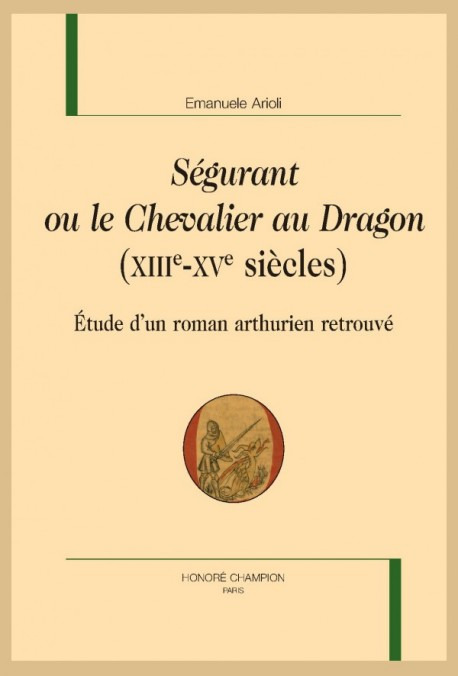
So what's this "missing knight" about? Well as the title says. There was a knight part of the Arthurian myth, and he had been missing ever since the Middle-Ages, and he was only recently rediscovered.
Or rather, to be exact - there was an Arthurian novel centered around a knight that existed and was a famous and well-known part of the Arthurian literature in the Middle-Ages, but that completely disappeared, and was forgotten by culture (as much popular culture as the scholarly one). Until very recently.
This rediscovered novel has been a hot topic of all Arthuriana fans in Europe for a few years now - and yet I do not see much talk about this onto this website, despite Tumblr being a big place for Arthurian fans?
So I will correct this by doing a series of posts about the subject. And this post will be the first one, the introduction post presenting to you "Ségurant, le chevalier au dragon" ; "Segurant, the knight of the dragon". A French medieval novel part of the Arthurian literature (hence the "chevalier au X" title structure - like Lancelot, the knight of the cart or Yvain the knight of the lion from Chrétien de Troyes), the reason this story was forgotten by all medievalist and literary scholars is - long story short - because it never existed in any full manuscript (at least none that survived to this day). It was a complete story yes, with even variations apparently, but that was cut into pieces and fragments inserted into various other manuscripts and texts (most notably various "Merlin's Prophecies").
The novel and the Knight of the Dragon were rediscovered through the work of Emanuele Arioli, who rediscovered a fragment of the story while looking at an old manuscript of a Merlin Prophecies, and then went on the hunt for the other fragments and pieces scattered around Europe, until he finally could compile the full story, that he then published in 2019, at the Belles Lettres publishing house, in 2019.
Arioli reconstructed the text, and translated it in both modern French and Italian for scholarly and professional editions (aka Honoré Champion in France, a reference for universities)...
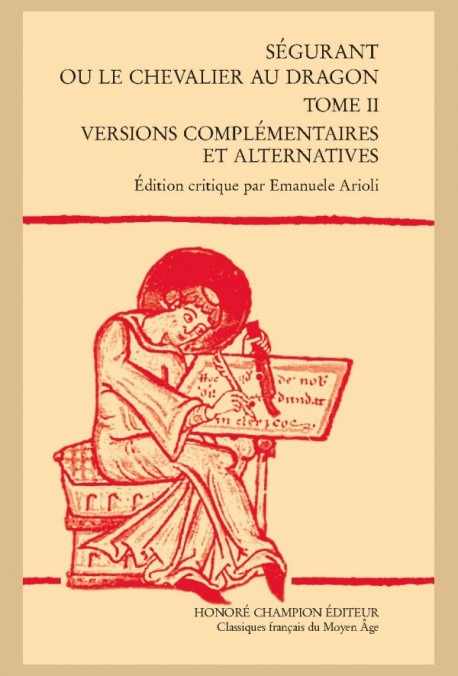
... But also for a more "all public, found in all libraries" edition - the famous 2019 edition at Les Belles Lettres.
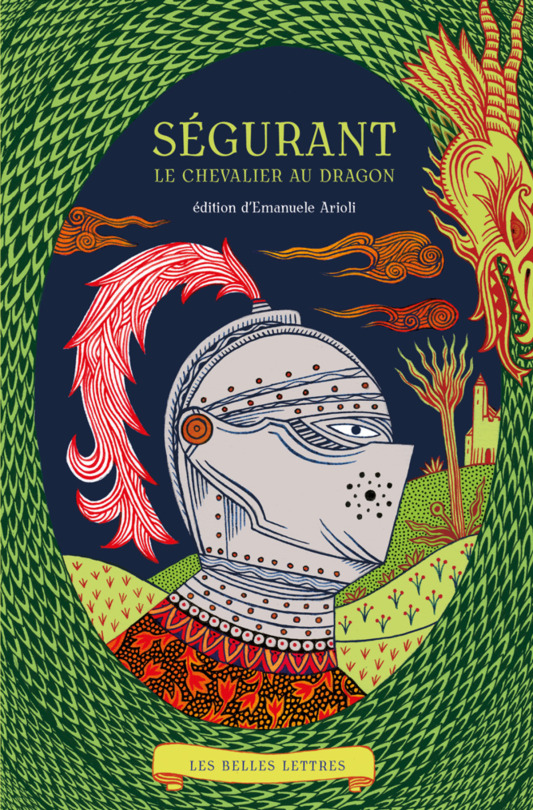
And not only that, but he also participated to both a comic book adaptation with Emiliano Tanzillo...
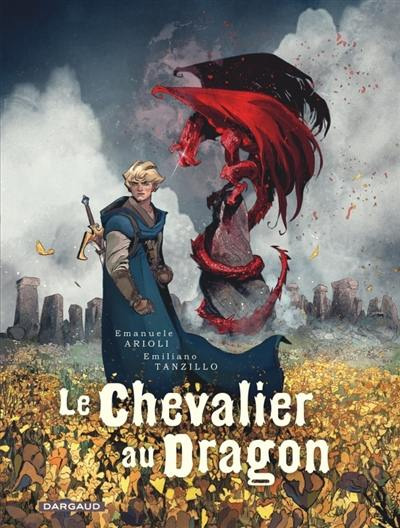
... and an adaptation as an illustrated children novel!

Finally, just a few weeks, the Franco-German channel Arte released a documentary about the reconstitution and content of this missing novel called "Le Chevalier au dragon: Le roman disparu de la Table Ronde". (The Knight of the Dragon - The missing novel of the Round Table). The full documentary is on Youtube in French for those that speak the language, here. And in German here for those who speak German.
Unfortunately there is no English version of the documentary that I know of, nor any English publications of the actual text - just French and Italian. But hey, I'll try to palliate to that by doing some English-speaking posts about this whole business!
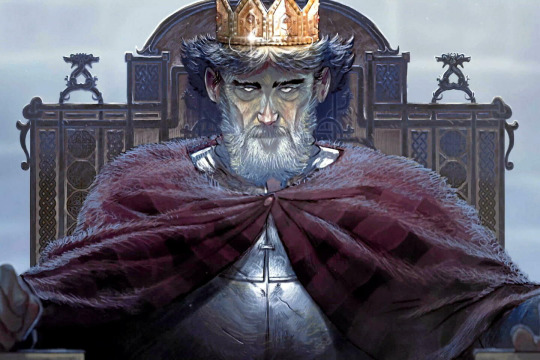
#ségurant#segurant#the knight of the dragon#le chevalier au dragon#arthuriana#arthurian myth#arthurian literature#arthurian novel#discoveries#medieval literature#arthurian legend#arthurian knights#found media#lost media#that people didn't even know was lost
337 notes
·
View notes
Photo

Merlin
Merlin (also known as Myrddin, Merlinus) is the great wizard of the Arthurian Legends best known from Sir Thomas Malory's Le Morte D'Arthur (1469 CE). The character was created by Geoffrey of Monmouth in his History of the Kings of Britain (1136 CE) where he first appears as a wise and precocious youth with prophetic powers. The French poet Robert Wace (c. 1110-1174 CE) then translated Geoffrey's work and added to it in his Roman de Brut (c. 1160 CE). Merlin was later featured as the central character of the Merlin by Robert de Boron (12th century CE) who cast him as a Christian prophet, and this depiction, with some variation, would continue in the Vulgate Cycle (1215-1235 CE) and the Post-Vulgate Cycle (c. 1240-1250 CE) to influence Malory's final characterization of the seer.
In Malory, Merlin is Arthur's mentor, instrumental in every aspect of his life from his conception to his education, his rise to power, and his vision of a kingdom ruled through justice and goodwill. Merlin is central to the lives of all the main characters of the legend, able to see both past and future, eager to advise and be of service, but unable to alter what he knows must be.
From his earliest appearance in medieval literature, Merlin has remained among the most popular characters in the legends. He may have originally been a fertility god or spirit, feared or revered for his great wisdom and magical abilities, and this concept of Merlin was revived in 19th-century CE romantic literature. Since then, he has appeared in or influenced numerous works of fiction, film, and other media, almost always depicted or referenced in this same way, as a powerful mage.
Name & Origin
Merlin first appears in literature in the History of the Kings of Britain by the Welsh cleric Geoffrey of Monmouth (c. 1100 - c. 1155 CE). The Merlin character's name is not a proper name (designating an individual in this case) but a toponym (a place name), specifically the Welsh Caermyrddin (“Merlin's Town”), referring to the city of Carmarthen, Merlin's birthplace. Geoffrey Latinized Myrddin as Merlinus because the strict Latinization of Merdinus would have associated the name with the Latin merdus (feces, dung). The character originated in Welsh folklore featuring the wildman-in-the-woods motif, a half-savage who lived on the fringe of civilization possessing great power and wisdom.
The most famous Welsh wildman was Myrddin Wyllt (“Myrddin the Wild”), a 6th-century CE bard who was said to have gone insane after a particularly bloody battle and retreated to the woods. Geoffrey wrote a short work, The Prophecies of Merlin (c. 1130 CE), prior to his famous history but this Merlin has nothing to do with the wizard of the Arthurian Legends. After the success of his History, Geoffrey wrote another work, The Life of Merlin (c. 1150 CE), in which the main character exhibits magical and prophetic skills but this work is unconnected to the Arthurian Legends.
Continue reading...
34 notes
·
View notes
Text
So the thing is, when I first watched Merlin, I had not yet seen Hadestown, but my very convoluted take was that it was a very Hadestown-esque situation where Merlin the show was attempt 5873 or whatever by Kilgharrah and the in-universe powers that be to create an Arthurian world in which Arthur does not die, and other known tellings or works or spins on the myth (Le Morte de Arthur, Idylls, The Once and Future King, take your pick) are all past attempts. This explains all the slight variations--Guinevere being a servant girl so perhaps this time Arthur wouldn't notice her and wouldn't become the catalyst for the kingdom's downfall, Merlin is younger and more of a contemporary for Arthur and is prevented from being taken out of play by falling in love with Nimueh and being trapped in a cave, Lancelot is also a commoner and less likely to become a knight--I could probably come up with more. Kilgharrah manufactures the entire prophecy to keep Merlin close to Arthur and keep him alive, but in spite of everything, it all fails. Arthur always dies, "it's a sad song, but we sing it anyway," etc etc
#to be clear i knew this was way too convoluted to be an actual theory but a girl could dream you know?#this is why i particularly love fix-it fics for Merlin because with this much mythos behind it the walking backwards out of the myth is#especially satisfying#merlin#merlin bbc#hadestown
69 notes
·
View notes
Text
Title: The ‘City of Camelot’ is only a tiny section of a much larger picture
Episode: "Excalibur" questions #3
Questions by @tansyuduri
Tagging: @miyriu
Books used for reference: Dangerous Quests, Sword and Sorcery, Merlin Heroes Guide, Merlin Complete Guide, The Death of Arthur, Merlin Villians Guide and Merlin Annual 2013
Question: Didn’t people think it was weird for Tristan De Bois to publicly blame Uther for his sisters death?
After all, fatalities in childbirth were high back in the Middle Ages and medicine wasn’t nearly as good as it is in modern times?
My answer: You’re forgetting that magic was tolerated at that point and Nimueh was publicly at court as their guest before her banishment.
Obviously, no one (except Gaius) knew of the deal that was struck between Uther and Nimueh. The deal that involved a life-for-a-life as part of the bargain.
However, the members of the court likely knew that a High Priestess had been invited to court during Ygraine’s pregnancy, then the queen died in childbirth (probably something that was rare with powerful healing magic) and then their king banished the sorceress from court on pain of death.
Therefore, Tristan blaming the king for his sisters death could have been taken a number of ways; including insurmountable grief or even for bringing the unknown sorceress into court to begin with.
Especially, since magic was tolerated back then and yet most people were still wary of it.
On that note, Agravaine despised not only Uther for his sisters death, but also his nephew and tried to kill him for his sister dying in childbirth.
So maybe that level of insanity and revenge, just runs in the family.
😬
Book description:
It was due to his magical knowledge that Gaius was chosen to negotiate with the sorceress Nimueh to arrange an heir for Uther.
This pact not only brought the king and the physician together, the shared secret bound them to each other forever.

Question: Ygraine was said to have been pretty friendly with magic users.
It's possible magic (or being a seer) ran in her family?
My answer: Morgause implied that she knew Ygraine well and that she was an honorable woman, so it’s possible her family possessed at least some form of magic.
We know Agravaine didn't possess magic, but it’s possible Tristan did… at least a small amount of magic. 🪄
The reason I believe this could be a possibility is because The Knights of Medhir are also Wraiths and they have no power. Yet, their magical rating is three stars (⭐️⭐️ ⭐️). Likely because of the powerful magic used to resurrect a Wraith and make it borderline invincible.
Meanwhile, The Black Knight is a Wraith and his magical rating is five stars (⭐️⭐️⭐️⭐️⭐️).
Given the two star difference between both sets of Wraiths. It’s possible that Tristan De Bois might have started with a two star 💫 magical rating.
[If Tristan didn’t have magic, then it’s possible the two star difference between him and the Knights of Medhir, was simply due to him being summoned by Nimueh and the other seven wraiths being summoned by the less-powerful Morgause.] 🫡
Book description:
The Knights of Medhir have no power or free will of their own, but once awoken by a sorcerer they are capable of fighting on relentlessly - deadly, invulnerable and immortal.
Black Knight magical power: ⭐️⭐️⭐️⭐️⭐️
Knights of Medhir magical power: ⭐️⭐️⭐️
- Nimueh was without question one of the greatest and most powerful sorceresses ever to have lived.




Question: Tristan De Bois swore as he lay dying that he would return to seek vengeance on Uther and he came back as a wraith.
Obviously, he's a seer?
My answer: Its possible, but it sounds more like Tristan was vengeful over his sisters death and simply used his dying breath to spew empty threats at her husband?
If he was a seer, he would have to be an extremely powerful one in order to see over 20 years in the future.
Therefore, it seems less like a prophecy and more like Nimueh took advantage of the distraught brothers grief and simmering anger to fill her own purposes, twenty years after his death.

Question: In the legends, Sir Pellinor was Percival's father, who hunted the Questing Beast and was ultimately killed by Gwaine.
Now he’s going to fight the Black Knight?
My answer: In the ‘Merlin Annual 2013 book’, Percival is confirmed to NOT be of noble birth.
This was something the majority of the fandom assumed, given how he ended up knighted, but up until now had not been confirmed outright.
When Sir Pellinor was killed in battle by the Black Knight, it was said that, “Camelot was robbed of two of its bravest defenders.”
(The other brave defender being fellow knight… Sir Owain).
Book description:
Percival Is a gentie giant who has a great love for Camelot. He Is as much admired for his kindness as he is for his strength, and he has a rich sense of humour.
Sir Percival is a friend of Lancelot, which is how he first came to Camelot. Although he is not of noble birth, Arthur knighted him in recognition of his bravery.
- During combat, Pellinor knocked the Black Knight's sword from his hand. He followed this up with what should have been a mortal blow.
But, as in the earlier fight, the Black Knight did not fall. He went on to kill Pellinor.
The magic of the wraith robbed Camelot of two of its bravest defenders.

Question: "Came to the gates of Camelot and challenged him" is interesting, because it means Tristan was not in Camelot?
Also, how would Tristan know about Uther's involvement in Ygraine's death?
My answer: I don’t necessary think that sentence implies Tristan didn’t live in Camelot.
Camelot is not just the Citidal (aka castle) and the City itself (which is the area we see most often in the show with the marketplace, houses of the townspeople, Rising Sun tavern, ect…)
Camelot kingdom also consists of large expanses of landscape. Including lands owned by various nobles, farms, various towns/villages, mountain ranges, lakes, entire forests, castles, a beach and the Labyrinth of Gedref.
As the eldest son, Tristan probably lived at his family’s estate (as I assume Agravaine also did up until the fifth season) and that estate would more than likely be somewhere out in the country as was common for the majority of noble families.
So Tristan wasn’t necessarily coming to Camelot from a different kingdom. More likely he was coming from his noble family estate to the City of Camelot.
I don’t think Tristan knew of Uther’s involvement in Ygraine’s death and his sister couldn’t tell him, because even she didn’t know the full details of the deal her husband made.
Ygraine: Your father betrayed me. He went to the sorceress Nimueh and asked for her help in conceiving a child... You were born of magic.
I'm sorry, Arthur. Your father has deceived you as he deceived me. To create a life, a life must be taken. Your father knew that.
Morgause used her magic to bring Arthur's mother, Ygraine, back from the dead.
(Source: Page 77 of Merlin’s Villains Guide)
Book description:
The city of Camelot was no place for Druids, not when King Uther had banned the use of magic, on penalty of death - but it had the best markets in the kingdom, the only places where certain important supplies could be found.
- This was not the object of the Labyrinth of Gedref. It was a doorway - a huge and complex doorway - to a distant shore.
The beach where Merlin now sat was accessible in no other way than through the maze - and there was no exit.
Episode: The Sins of the Father
Ygraine: Your father betrayed me. He went to the sorceress Nimueh and asked for her help in conceiving a child... You were born of magic.
I'm sorry, Arthur. Your father has deceived you as he deceived me. To create a life, a life must be taken. Your father knew that.



#merlin emrys#merlin book#merlin#arthur pendragon#bbc merlin#merlin bbc#the adventures of merlin#merlin lore#merlin nimueh#merlin black knight#merlin morgause#merlin ygraine#sugar prat chronicles
8 notes
·
View notes
Text
Merlin and Morgana decide to de-age and go to Hogwarts, since they're bored. They end up in Harry's 5th year.
Morgana is horrified with Umbridge's clothes and doesn't even realize Umbridge is actually a person or well, something close to it, so Morgana lets out a "For fucks sake, what even is that pink thing there?" really loud when she and Merlin are waiting the firsties to be classified so they can be classified, since they're transfer students. Umbridge is not happy, but it turns out Merlin and Morgana planned really ahead and made themselves untouchable to Umbridge 'cause their "parents" made a really generous donation to the Ministry, so Umbitch can't do anything to them, Umbitch just gives Morgana a really fake smile and says "I'm the Defense Against Dark Arts professor, dear" to which Morgana just nods and tells Merlin telepathically "This fucking toad is gonna teach? Please, let's go home Merlin, please, I'm not bored anymore" and Merlin just laughs and replies "It's too late now, love". The Hat lets Merlin and Morgana decide where they wanna go, since they really helped with founding Hogwarts. Both of them end up choosing Gryffindor, 'cause when they saw Harry they were like "Yeah, this one's gonna need all the protection and help we can give, he has the same vibe Arthur had of trouble finding him".
When the DA started, even though Merlin and Morgana didn't agree with that stupid idea, they were one of the first people to sign the parchment Hermione had.
Harry, Hermione and Ron think that these new transfer students are a bit weird, but if they wanna help and they actually believe Harry even though they seemed to have no idea who Harry nor Voldemort were before someone explained to them.
Harry is way too tired to think about the weird transfer students. He already has to juggle his time between his secret boyfriend (Draco), his friends, the DA and having Voldemort in his head doesn't really help with the stress.
Merlin and Morgana didn't signed up for this, but if this poor Harry Potter kid is being targeted by an insane guy with a snake face, then he really is a magnet for trouble like Arthur was-Wait, hold that thought, are we sure Arthur would return in his own body? 'Cause what if this kid is Arthur's reincarnation? Nah, 'cause honestly Arthur wasn't the first person to attract trouble every time he blinked, so they're just reading too much in that.
When Harry ran to the Ministry, Merlin and Morgana went with the group as well and when the Death Eaters attacked, they managed to capture all of them and leave a little note to Fudge that read "Here's a few gifts, Minister ;) " Harry and his friends just looked at Merlin and Morgana stunned 'cause they never showed that they could take someone out in a duel so quickly like they did with the Death Eaters! They didn't even had to leave the Prophecy room! When they were leaving and the Order + Voldemort and Bellatrix showed up, Merlin and Morgana just looked at them and Merlin asked Morgana "Oh, I think they have a veil here in the Ministry, should we give the Snake face to Cailleach? I think she'll appreciate the gift!"
So when they stun Voldy and go handle him to Cailleach, Cailleach says she's been wanting him for a while, but they also need to get the Horcruxes Voldy made and just throw them through the veil. Harry & Co are really confused by that, but Merlin & Morgana just nod and leave to go look for the Horcruxes. They come back pretty quickly and start throwing the fucked up thing to Cailleach. Merlin & Morgana feel that there's one in Harry, so they're like "Can we use a spell on you real quick?" and when Harry allows them to do it, they take the Horcrux out and put it in a quill just because and throw it through the veil. And with that Voldy is defeated. Harry & Co are still confused of how that happened and who exactly are these transfer students, but oh well, they helped so they can't be the villains here, right?
#fanfic prompt#fic ideas#fic prompt#fic inspiration#drarry#harry x draco#harry potter x draco malfoy#harry potter#harry james potter#draco malfoy#draco lucius malfoy#draco x harry#merlin x morgana#merlin x harry potter#merlin emrys#morgana pendragon#crossover#drarry fanfic prompt#drarry fic idea#fic idea#fanfic inspo#fanfic inspiration#fanfic idea#order of the phoenix#drarry au#mergana#mergana au#alternative universe#au#merlin and morgana go to hogwarts
28 notes
·
View notes
Note
Who are Maleficent's allies for the KH Divergence saga, and what is the story behind Pandemoniac Heartless Parade?
In my KH4, Maleficent has summoned all remnants of her old minions from Enchanted Dominion to assist her and the Heartless in their big magical science project with the relics of power from the ancient age and date from the Book of Prophecies (I'm not remotely kidding here, Maleficent goes full Arcane Hextech in this story!). In addition, she still has Pete and the Gullwings (Yuna, Rikku, and Paine) around, and Pete's called up the Beagle Boys to help too.
Y'know, these guys:

After KH4, however, Maleficent has been rendered powerless and with only two flunkies to carry out her plans for her - Pete, and the newly introduced Mortimer Mouse, a Duke from Disney Town who always wanted the king's throne and a Keyblade but could never have either, so he turned traitor back in the Disney Town/Castle segment of KH4. From the powers of darkness, Mortimer forged a faux-Keyblade that can slay Demi-Deterged and freeze hearts in place, but cannot actually unlock anything or set any hearts free. The duo of Pete and Mortimer would be set up in The Missing Links, but they don't get particularly active as a menace to the worlds until KH5.
Pandemoniac Heartless Parade? Oh, that is a fun one. The idea for that spinoff would be that it's a reality where Maleficent won in KH4 rather than get defeated and depowered. Her plan to submerge the existing World in darkness while she rules and dictates the course for the newly recreated "Ye Olde World" succeeded, so now she schemes to gain access to the real Kingdom Hearts via the false one that was a built-in thing for this Olde World. Said Olde World now sits atop the ruins of the previous World (like Piltover and Zaun, more Arcane shit there!) and rather than be split into different "worlds", it splits off into different "sectors", each ruled over by a Disney Villain who command their own forces. Within this setup, you create an OC to serve Maleficent and work alongside Pete and Mortimer (and other allies like the Gullwings and the Beagle Boys) in keeping things in check. The "story" comes as an Excuse Plot to intermingle with the Disney Villains and various enemies: all this World's Heartless, out of nowhere, start turning on each other and creating feuds between different classes of enemy and different villains who command them. Like there's OG Darkling Heartless VS Emblem Heartless, Colorful Heartless VS Dark Heartless, Humanoid Heartless VS Beastial Heartless, Organic Heartless VS Manufactured Thing Heartless, Heartless VS Unversed VS Nobodies VS Nightmares VS Demi-Deterged, etc. Obviously this creates a panic from Pete and Mortimer as they fear Maleficent's authority will be undermined this way, and SPOILERS: it turns out that's the whole idea, as Hades is behind all this and has been out to usurp Maleficent's rule from the start, and he's conspired with newcomer villain Cruella De VIl to put this scheme in motion. It's on your character to unravel the conspiracy and stop it so that...Maleficent can stay in power and ultimately unlock the way to Kingdom Hearts. You are playing as a baddie!
The villains that'd be featured aside from Maleficent and co.:
Madame Mim (villainous counterpart to Merlin) Cruella De Vil Hades, Pain & Panic, and the Titans Ursula, Flotsam & Jetsam Oogie Boogie, Lock, Shock, & Barrel Captain Hook & Mr. Smee Jafar Shan Yu Scar & the Hyenas Gaston & LeFou Dr. Hamsterveil, Jumba Jookiba, Captain Gantu & Reuben John Worhington Foulfellow & Gideon Dr. Facilier Mother Gothel Prince Hans of the Southern Isles Prince John, Sir Hiss, and the Sheriff of Nottingham Yzma & Kronk King Candy/Turbo and Dr. Heinz Doofenshmirtz
'Twould be so much fun, I so wish it was real!
#Disney#Kingdom Hearts#KH Divergence#disney villains#Maleficent#Pete#Mortimer Mouse#the Beagle Boys#the Heartless#trivia#headcanon#what could have been#Pandemoniac Heartless Parade
9 notes
·
View notes
Text
MerGana and How Their Extremism May Follow Vulgate/Robert de Boron's Good vs. Evil Story
I think making bbcMorgana's first acts in S3 and S4 of saying that it was good that women and children of camelot will die was a fascinating and deliberate choice of making sure she was ireedemable and "evil" in the eyes of the audience.
The framing of bbcMorgana as killer of innocents (even when she was just following bbcMorgause's orders) in juxtaposition of bbcMerlin as vigilante executioner of treasonous criminals makes the audience lean more favorably towards bbcMerlin's extremism.
Writing bbcMorgana as one who takes pleasure in the suffering of others also enabled the producers to makes sure that the audience can forgive bbcMerlin's own crimes because he does it with obvious anguish.
............
Points to consider though:
BbcMorgana was educated for one year that what she was doing was right and justified. Based on her intimate knowledge if the peopleof Camelot, they are all complicit in the deaths of millions of the magic race and their allies. Her extremist training under bbcMorgause amplified that drive to punish all and then rejoice in their downfall. The bbcMorgana who cared for the wellbeing of Camelot already died when she was executed without trial and due cause (basically assassinated) for the sake of the Kingdom. (Remember, hemlock has no antidote)
BbcMerlin's extremism allowed him to bypass laws that even Camelot held dear. But since he does this with anguish, sorrow and burden of destiny/god's will then, he is forgiven and justified by the watchers of his acts even though he usually held the metaphorical gun at point blank range and then called it "self-defense"
............
I would say the merlinbbc show matches with the way The Story of Merlin was written in Robert de Boron tradition and the Vulgate. The clear distinction between good and evil in these classic literature was always "light and dark", "hatred and love."
Commiting heinous acts in "wrath, bitterness and revenge" "and taking pleasure in suffering" was the "work of the devil" "letting the devil into one's heart" (as the case of vulgate!merlin's conception)
And committing heinous acts while in anguish is technically acceptable in the eyes of destiny and the christian god. (As was the case of robertdeboron!merlin assisting in arthur's and ector de maris's conception)
...........
Then there is an argument that the show followed the heavily christian vulgate philosophy of good and evil all along?
That other philosophies and ideas which revolve around good/evil, light/dark, hatred/love being in constant balance should not be applied to the show because classic arthuriana doesnt use them?
..................
Redemption, also leans on the idea of bbcMerlin spreading the "good word" to the others. That the unbelievers will be saved if they join him in backing the One and Only Savior and King. If they don't and if they fight against it then there will be a judgement. It is never the other way around despite the unbelievers also having valid justification. As expected this reflects the highly christian messaging of the classic source material too.
Then if other watchers lean/sympathise more towards the motivations and actions of the "antagonists," "the unbelievers," "members of the old religion that fight against the prophecy" then they are "letting evil prevail" and "you dont understand the objective of the story"
Would it also mean that such antagonist-sympathetic fandom wank are technically not worth rehashing because it would be too rooted in actual historicity/real life instead of the classic arthurian mythology and christian influences that the show was based on?
.............
Anyhow the next time you hear people saying that the merlin bbc writers were stupid and didnt know what they were doing, please reconsider.
#otp: hatred to your love#otp: darkness to your light#vulgate#prose merlin#on how merlin bbc follows classical arthuriana: good vs evil#thots#heli blobbing#merlin meta#natural dyad#its an extremist vs extremist game#ultimately this was written as a mergana dynamic thing#theyre both terrible your honor
7 notes
·
View notes
Text

N. C. Wyeth illustration for Sidney Lanier's The Boy's King Arthur (1922) "Then the king ran towards Sir Mordred, crying, 'Traitor, now is thy death day come.'"
Prophecy of Arthur's Death by Sir Mordred his son Then Merlin came by in the semblance of a fourteen-year-old boy; he saluted the king and asked him why he was so pensive. “I may well be pensive,” said the king, “for I have seen the most marvelous sight that I have ever seen.” “I am well aware of that,” said Merlin, “and I know your thoughts as well as you yourself do. But you are a fool to worry about things that will not do you any good. Also, I know who you are—who your father was, and of whom you were begotten. For King Uther was your father and conceived you on Igraine.” “That is false!” said King Arthur. “How could you know that? You are not old enough to have known my father.” “Yes,” said Merlin, “I know this better than you or any man living.” “I will not believe you,” said Arthur, and was angry at the child. So Merlin departed and then returned again in the likeness of an old man of eighty years of age; this made the king glad, for he seemed to be a wise man. Then the old man said, “Why are you sad?” “It is understandable that I would be sad,” said Arthur, “for many reasons. Just now there was a child here who told me many things that it seemed to me he could not know, for he was not old enough to know my father.” “Yes,” said the old man, “that child told you the truth, and he would have told you more if you had allowed him. But you have done a thing lately which has displeased God: you have lain by your sister and on her you have conceived a child that shall destroy you and all the knights of your realm.” “Who are you,” said Arthur, “who can tell me these things?�� “Sir, I am Merlin, and I was he in the likeness of a child.” … Then King Arthur had all the children who were born on May-day sent for—those who were begotten of lords and born of ladies—for Merlin told King Arthur that he who would destroy him and all the land would be born on May-day. So he sent for them all on pain of death, and the sons of many kings and the sons of many knights were rounded up and sent to the king. And King Lot’s wife sent Mordred. They were all put in a ship and sent out to sea. And some were four weeks old, and some less. So by fortune the ship was wrecked near a castle, and the greatest part of it was de- stroyed. But Mordred was cast up onto the beach, and a good man found him, and fostered him until he was fourteen years of age, and then brought him to court, as it relates near the end of the Morte Darthur. Many lords and barons of the realm were displeased that their children were lost. Many blamed Merlin more than Arthur, but out of fear and love, they held their peace. —Sir Thomas Malory, Morte D’Arthur trans. by Dorsey Armstrong
3 notes
·
View notes
Text

(From Culhwch and Olwen)

(From Vita Merlini)
I've been bitten by the idea bug and have been brainstorming about how Guinevere and Morgan can each have their own women-only orders/girl gangs.
So here's a concept of Gwen and Morgan's gangs with the caveat rule of "they're always grouped in numbers of Nine" (because Nine is a mystical number and stuff, lol). Its a work in progress through:
Morgan's Group:
Morgan le Fay/la Dieuesse
Sebile (could be identified with anyone below)
Queen of Norgales
Queen of Eastland and/or Sorestan?
Queen of the Outre Isles?
Lady of Avalon? (Possibly Enfeidas, see below)
Lady Bertilak?
?
?
Guinevere's Group:
Guinevere
Isolde
Enide
Lady of Malehaut/Bloie
Creiddylad?
Olwen?
Maleagant's Sister?
Elibel/Elyzabel?
?
Undecided, Unaffiliated, or are second-degree related:
Nimue/Vivianne
Guinevere's other relatives (Lenomie, Flori, Jandree)
Brangwaine
Fenice and Thessala
Hellawes
Annowre
Britomart
Silence
Indeg
Tegan Eurfron/Guinier
Laudine and Lunette
Perse (Hector de Maris' Beloved)
Guinloie?
Lady of Nohaut?
Isolde White Hands?
Brandegorre's daughter?
Exceptions (people who I feel shouldn't be part of either Guinevere or Morgan's groups for one reason or another) are:
Morgause, her daughters (Soredamors, Clarissant) and daughters-in-Law (Guinevak-Cwyllog, Lynette and Lyonesse, Ragnelle, etc.),
Elaine of Garlot/Blasine/Brimesent, Elaine of Benoic/Clarine/Gostanza.
Older generation ladies like Igraine, Igraine's Sisters, Isolde the Elder, Blanchefleur/Elizabeth/Tristan's mom, Enfeidas and Ganieda
Grail Saga Ladies: Dindrane/Percival's sister, Amite/Elaine of Corbenic, Brisen, Queen of the Wastlelands and Kundry.
Elaine of Astolat
Tryamour/Lanval's Beloved?
Morfydd? Gaia Pulzella?
Percival's Beloveds (Angharad, Blanchefleur, Kondwiramurs)
the Beloveds of the next generation (Blonde Esmeree, Marthe, Elsa, etc.)
The next generation ladies (Archfedd, Melora, Gyneth, Seleucia, Licorida, Andronia, Enneuawc, Kelemon, etc.)
#morgan le fay#queen guinevere#nine sorceresses#vita merlini#geoffrey of monmouth#celtic mythology#welsh mythology#prophecies de merlin#culhwch and olwen#oc#my thoughts#writing prompt#arthuriana#arthurian literature#arthurian mythology#arthurian legend#arthurian ladies
14 notes
·
View notes
Text
deep sigh. ok i've been thinking about a different angle regarding arlecchino: one that would link her to the golems of ancient remuria and the legend of the holy grail. if i throw enough theories at arlecchino one of them is bound to stick, right?
i mentioned before that in arthurian legend there is something called the siege perilous, which is an empty seat at the round table reserved by merlin for the one who would be *successful in finding the holy grail. this led me to believe there could be a connection to the vacant 10th seat within the fatui harbingers. there are some obvious similarities between merlin and pierro so it's not that big of a stretch. they're both powerful mages, have white beards, and have stag imagery. (pierro's mask has one antler or horn sticking out.)

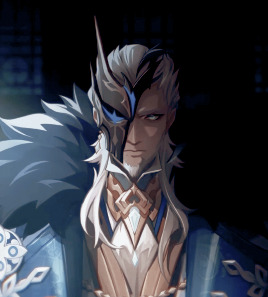
some other recent arthurian references in fontaine are:
the melusines
lyney and lynette who are based on the sisters lynette and lyonesse** who lived at castle perilous
a local legend fatui operative called yseut
the great magician parsifal and her sister josephine etc. you get the idea
(anfortas and klingsor are also arthurian characters but as far as we know they are connected to khaenri'ah instead of fontaine.)
in any case, i started to look for a holy grail equivalent in the game. there is actually a monthy python and the holy grail reference in one of the notes. "mounted python & the pure grail," is a play based on the supposed tales of the lochknights. this could mean the holy/pure grail does exist.
turns out, we do have something resembling a grail in this game. it's a weapon ascension material: the golden goblet of the pristine sea.

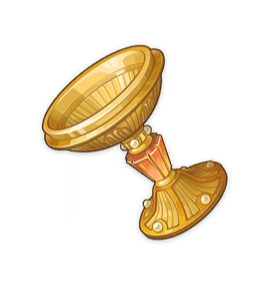
this was remus' goblet with the extracted ichor from the primo soup. remus believed the ichor would bring eternal life and infinite wisdom just like the holy grail could grant immortality etc. the goblet, filled to the brim with ichor, was ultimately stolen by boethius, who used it to seal the dragon scylla underneath the tower.
Shocked by the foolhardy betrayal of the God King, the musician summoned the last guards, and used the insoluble Ichor to seal the dragon beneath the tall tower, and sank into the abyss with the capital. Afterwards, this noble thief vanished silently from history, and only the "Golden Troupe" faithfully remembers his prophecy.
it's unknown what happened to the goblet, or if it's connected to the lochknights, but what if the goblet is something arlecchino is after? or perhaps it's already in her possession? perhaps she was even born/created from the ichor in the goblet.
to clarify, i don't think arlecchino is after the 10th seat (bc she already has a rank lol), but maybe she is connected to the golden troupe, who were alligned with boethius' views. they were determined to restore remuria by attempting to reawaken the golems.
To save their waning civilization and their desire to transcend, the Golden Troupe played melodies most wondrous, enticing children to offer their precious souls to the sleeping golems.
what caught my attention is that golems are described as having skin as black as iron and are capable of devouring souls.
Combining the immortal stone with the Ichor essence extracted from primordial water, and carved into a race as black as iron— with arcane lithos for skin and Ichor for blood, never again fearing the curse of returning to the primeval past...
the golden ichor also turned black due to the agony of the many souls within, leaving only chaos behind. this could be connected to arlecchino's blackened arms.
should be noted that the research of rene, the leader of the narzissenkreuz ordo, borrows a lot from the golden troupe. rene's last name is de petrichor, which means golem in "the old language". we still haven't seen these golems yet, which are implied to be in the region of petrichor, which means we might get to go there in future patches.
another interesting part are these ominous lines from the golden troupe artifact:
Golden Troupe's Reward When the great golden symphony plays once more, the Golden Troupe will receive the rightful rewards owed to the true and loyal. When the perfect order separates humanity into master and servant, prosperity and beauty shall make the kingdom glorious once more… Abide until that day… Abide until that day… When every member of the Golden Troupe shall win the whole future as their prize.
if arlecchino has ties to the golden troupe this could be her true goal.
curiously enough, there is this bit from the weapon ascension material wine goblet of the pristine sea that aligns with the lore of the new weapon ballad of the fjords which recounts the legend of ajax.
Wine Goblet of the Pristine Sea The silent golem still dreams the dream of the empire — not knowing it has been over a thousand years since the empire's obliteration.
Ballad of the Fjords This ancient capital had sunk into the depths of the earth due to some ancient disaster, but despite being buried underground, it was still as bright as the dawn. The solemn and silent king yet sat upon his massive chiseled white throne, the scepter in his hands not yet eaten away by insects, And the silver-white trees in the courtyard were like the arms of a mother or a lover, holding the virtuous and wise priest in their embrace. Beautiful yet treacherous life, twisted and violent monsters, one by one awakened from their thousand-year slumber…
there might be no connection here but i thought i should mention it anyway since arlecchino's fellow harbinger childe is named after ajax.
(*the most notable ones successful in retrieving the holy grail were percival and galahad. we have two parsifals in this game, but for now neither seem to be connected to the goblet or the golden troupe.
percival had a son named lohengrin, the swan knight, part of the knights of the grail. this was a secret order of knights who were tasked to provide lords to kingdoms that had lost their protectors. this would fit with arlecchino's swan imagery but it would clash with the schwanenritters (swan knights) we already have in game. but hey, who knows, maybe there could be a connection there.
**the enemy of lynette and lyonesse was the red knight, ironside, who had besieged their lands. the red knight's armor was red due to it being completely covered in blood. the red knight eventually befriended his enemy gareth and became part of the knights of the round table. notably golems are as black as iron; black iron is known as ironoxide and arlecchino has some vivid blood red accents.)
#.txt#arlecchino#lore bytes#please just let her be evil!!!! im not asking for much just a little vil
10 notes
·
View notes
Text
Arthurian myth: Merlin (2)
A continuation of the loose translation of the "Merlin" article by Yves Vadé for the "Dictionnaire des Mythes Littéraires".
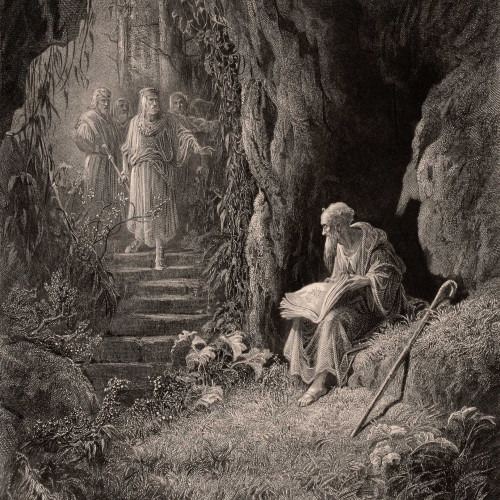
II/ Merlin in the Arthurian literature
As early as 1155, the Normand writer Wace transposed, for Alienor of Aquitaine, the “Historia Regum Britanniae” in French verse, in his “Roman de Brut”. He adds to the work the episode of the creation of the Round Table by Arthur, of whom Merlin will later become the prophet and the agent.
Merlin was barely mentioned by Chrétien de Troyes ; it is with Robert de Boron that he truly became the inspiration of the Grail’s knighthood. His work in verse, that contained at least the three romans known as “Joseph of Arimathea”, “Merlin” and “Perceval”, is partially lost in its original version, and it maybe even was unfinished. However, the prose translation of the “Merlin” was preserved, and seems to be quite faithful to Boron’s poem. The beginning of the roman takes back the motif of Merlin being born of an incubus demon, but it is now placed within a greater theological context: the demons wishes to produce an Antichrist, born of a virgin just like the Christ, in order to counter the Holy Incarnation. A demon managed, after some difficulties, to trick an honest young girl, but she immediately confessed her sin and she had the child baptized. From his father, the devil, Merlin received the knowledge of the entire past; and to counter this gift, God gave him the power to know the future. As such, Merlin is born with an universal knowledge. He uses it in the first months of his life to save his mother, threatened with burning at the stake ; then, at seven years old, he reveals to the usurper Vertigier the existence of the two dragons hidden under the foundations of his tower. He also reveals their meaning: the red dragon (Vertigier) will be killed by the white dragon (the young princes Pendragon and Uter, sons of the king Constant). Uter became king, and Merlin his advisor. He allows him to vanquish the Saxon during the battle of Salisbury, battle where Pendragon loses his life: Merlin had Stonehenge built in his memory, and Uter ruled under the name of Uterpendragon. A new element that would change the Merlin legend forever: it is through the idea and advice of Merlin that Uterpendragon has the Table of the Grail built, the “third table” after the one of Joseph of Arimathea, which itself was a copy of the table of the Last Supper. And, just like within Geoffroy’s work, it is thanks to Merlin that Uter can give birth to Arthur by uniting himself with the duchess Ygerne, that he marries soon after. Merlin raises Arthur in secret then he ensures his crowning and his rule. Merlin will keep assisting Arthur, so that both his kingdom and Christianity could prosper.
Visibly inspired by, if not written by, Robert de Boron, the “Perceval” of the Modène and Didot manuscripts give to Merlin a peaceful end, though an enigmatic one… After guiding Perceval through his quest, he announces the end of the enchantments within the Grail Castle. Once it is done, Merlin builds himself a home in the woods called “esplumeor” (a word with an unknown meaning). There, he escapes from both the flow of time and the sight of men, but he keeps making prophecies about what God asked him to reveal to humanity.
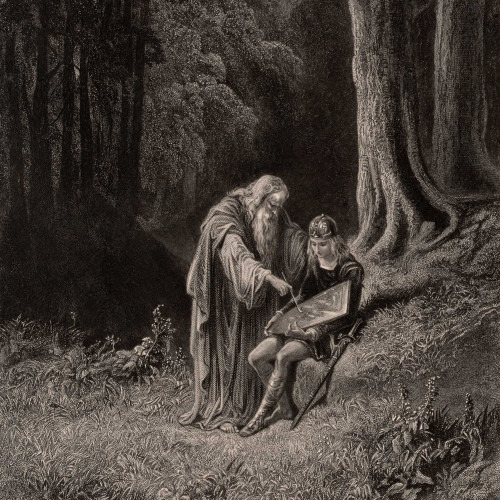
During the first half of the 13th century, two prose cycles formed themselves in France, each continuing Merlin’s story in a different way.
1) In the “Suite-Vulgate”, included within the greater cycle of the “Lancelot-Graal” or “Vulgate” (1215-1230), Merlin is the military advisor and strategist of Arthur in his battles against the barons that refuse his authority, then in his war against the Saxon, and finally in his feud against the emperor of Rome. Through Merlin, Arthur manages to marry Guenièvre, daughter of the king Laodegan, and he becomes the ruler in charge of the Round Table. But more importantly, it is here that Merlin encounters Viviane, the daughter of a lord named Dionas, at the edge of a fountain in the forest of Brocéliande. Wrapped around the tales of battles is a love story, during which Merlin allows Viviane to take away from him his magical knowledge. In order to keep Merlin all for herself, Viviane ends up capturing him within a “prison of air”, from where the prophet, now invisible, can still make his voice heard.
2) In the “Suite-Huth”, part of a cycle that was wrongly attributed to Robert de Boron, Merlin predicts the birth of Mordret, and the disasters caused by Balaain, the knight with two swords. It is Balaain that shall strike the “harmful blow” that will wound the king Pellehan and turn his kingdom in the “Terre Gaste”. Merlin is here much more involved in the adventures of the wandering knights than before. His role as an enchanter is put forward, as he is depicted commanding the wind, making the depiction of a dragon spit fire, open by magic the doors of a city, and preparing an enchanted bed that will remove from those that sleep within it their memory and their senses. The tale ends by the unfortunate love of Merlin and Viviane, which is a repetition of the love between Diana and Faunus. After bewitching Merlin, Viviane throws him into a vault whose stone cannot be removed. In his grave, Merlin screams one last time – and this last cry of the enchanter becomes the subject of an independent tale known as the “Conte du Brait”.
The first mention of Viviane is older than the “Suite-Vulgate”. She appears in the beginning of the “Lancelot” (or “Proper Lancelot”), under the name of Niniène, and she is depicted as a fairy of Bretagne that raised Lancelot in her wealthy domain hidden under a lake. Merlin appears here under a negative light. While his popularity is attested (it is said he was “so dreaded and so honored” by the people of Britany that all called him a “holy prophet” and common folks even called him a “god”), he is said to be “disloyal” and “deceiving” due to the nature of his father, and his knowledge is one of “perverse science”. The lady of the lake refuses his love out of wisdom, and she manages to trap him in “a cave within the dangerous forest of Darnantes”.
As such the character, that Robert de Boron tried to turn into the prophet of Christian knighthood, does not escape the ambiguity due to his composite origins, and which fits his genealogy, half-devil half-virgin. One can also see in his gift of shapeshifting a manifestation of his unstable personality, and of the contradiction of the several traits that compose him. This Proteus-like nature, certainly a remnant of the powers that were once attributed to the druids, allows Merlin to appear sometimes as a young man, sometimes as an old man, other times as a “woods-man/wild man”, and even as a great “branched stag”, as in the story of Grisandole (part of the “Suite-Vulgate”).
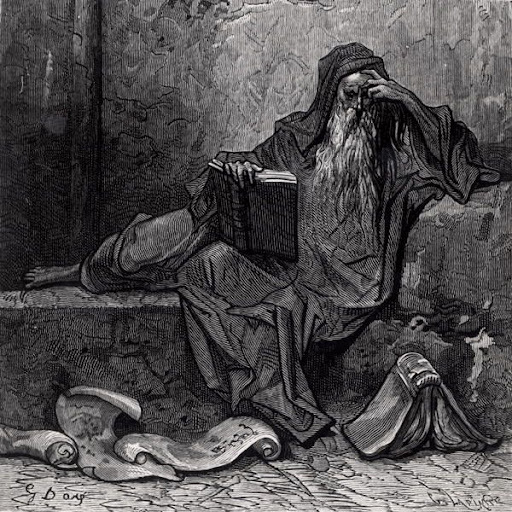
Built of successive additions, the tale of Merlin was reproduced, synthetized and translated, partially or entirely, by all the literatures of Europe until the end of the Middle-Ages. Even before 1250, the “Merlin” of Robert had been translated in the provençal language. The character also appears within numerous French verse romans of the 13th century: in “Fergus” (which places his lair in an isolated mountain), within “Le Chevalier aux Deux Epées”, within the “Roman du Hem”, within “Escanor”, within the “Roman de Silence” (where the Grisandole tale is found), and especially within “Claris et Laris”, which explains Merlin’s solitude by a crime he needs to expiate until his death. In the Prose Tristan (after 1240, Merlin takes care of Tristan, whose mother recently died, and gives him to a preceptor (just like he had done for Arthur in Robert de Boron’s text). Identified as a wizard, he builds a magical boat, the “nef de la joie”, for the king of Northomberlande. Outside of the knight-tales, a fairytale in verse of the beginning of the 12th century, “Du villain qui devient riche et puis pauvre”, also known as the “Dit de Merlin-merlot”, confirms the role among the “folk people” of Merlin as an embodiment of the supernatural.
The one that Dante called the “buon incantatore” was very popular in Italy, especially in relation to the work of Joachim of Flore. Among his apocryphal works there is an “Expositio Sibyllae et Merlini”. The tradition of Merlin as a prophet was enriched by a huge book of “Prophecies”, which mixed political predictions, sermons, and fictional stories. It was written in French between 1276 and 1279 by Venetian, probably a Franciscan. In the beginning of the 14th century, the Florentine Paolino Pieri mixed in his “Storia di Merlini” a tale of Merlin’s youth and the Italian translation of a part of the “Prophecies”. In 1480, Venice saw published six volumes of the “Historia di Merlino”, a great part also made of these prophecies supposedly made by Merlin.
In England, the “Merlin” of Robert and the “Suite-Vulgate” were recapped in a verse work known as “Arthour and Merlin” (1250-1300). Henri Lovelich gave an alternate version of this text in his “Merlin” (1430). A translation in Middle-English of the “Merlin-Vulgate” dates from the middle of the 15th century. Finally, sir Thomas Malory split the “Merlin” of Robert throughout the five first books of his “Morte d’Arthur”. This work, written in the prison of Newgate where Malory spent the last twenty years of his life, was printed in 1485 and constantly republished, and it ensured the fame of Arthur and Merlin within English-speaking countries.
In Germany, “Merlin und Seifrid de Ardemont”, by Albrecht von Scharfenberg (13th century) recaps Robert’s Merlin, with very important modifications (for example Pandragon and Uter are now the sons of Merlin). Other translations appeared in Holland. In Spain, the cycle of the pseudo-Robert de Boron was translated in the 14th century by the brother Juan Vivas, while the “Demanda del Sancto Grial” included a “Baladro del sabio Merlin”, derived from the lost “Brait de Merlin”. A Castilian version appeared at Burgos in 1498, and then another was published in Seville in 1535.
#merlin#merlin the enchanter#arthuriana#arthurian myth#arthurian literature#arthurian legend#medieval literature
24 notes
·
View notes
Text
I do feel the need to say that the prophecies de merlin have a very interesting / different attitude towards magic and the supernatural than other medieval romances --- the text explicitly associating magic with the demonic (and importantly not all magic -- mainly magic performed by women for nefarious ends) is actually really unusual for the period
#like lancelot does have that dream of Morgan in hell but she isnt in hell bc she does magic yknow#el.txt
8 notes
·
View notes
Text
Future Fics
Okay listen, I’ve fallen headfirst back into Merlin (I never left, I’ve just gotten better at maintaining my sideblogs) so have all the fic’s I’m planning and ones that are half written
Help Me write/vote which one you want to see first?(or put it in the tags/replies)
1) Merlin/Arthur; Reincarnation AU but ‘destiny free’ and angsty
2) Arthur/Happiness; Arthur is de-aged; and Leon becomes number one dad; which means Lancelot will not be outdone
3) Merlin/Happiness; Merlin is de-aged and everyone has to cover for him, under the impression no one else knows anything
4) Morgana/Happiness; Morgana has nightmares; and Merlin recognises the affliction, and confesses
5)Merlin/Arthur and Hunnith/Plot; Merlin finds out magic runs in both sides of his family and panics when his mother shows up in Camelot; aka Hunnith helps Morgana not fall down her dark path, scolds Kilgharrah for being a dick, and tries to meddle in her son's love life
5) Morgana/Mordred; Morgana attempts to de-age arthur to try to reclaim the throne, instead she curses herself, aka Season 1 Morgana during season 4/5
6) Merlin/Angst; Merlin can’t let go of those he’s lost, and neither are they will to leave him
7) Merlin/Arthur; The dragons return with a prophecy for the new land of Albion, telling of a more dangerous threat than the once and future kings death, now everyone races to decipher it
8) Merlin/The Knights; after a playful competition to teach the knights how to accept favors during meele’s Merlin starts receiving them even once it’s finished
9) Merlin/Arthur; Saturnalia festival, Merlin finds the bean and the knights declare him king for a day, it's only fair he and Arthur swap positions, which leads to a very awkward love confession
10) Aithusa /Family; Kilgharrah lies, Arthur meets Aithusa and Merlin learns there are things worse than keeping Aithusa a secret
11) Merlin/Arthur; Soulmate AU; everyone has a soulmark, an image that moves and grows/changes with them; Arthur’s never moves and never changes
12) Balinor/Hunnith, Uther/Ygraine Merlin/Arthur; Merlin tries an aging spell, and learns about his father through an unlikely source; aka he's Balinor's age and Uther mistakes him for Balinor come to haunt him
13) Merlin/Arthur/The Knights; a 5+1 concept; Arthur is both touch starved and unable to understand personal boundries; basically all the times the knights realized he was in love with them in a way, and the one time Arthur realized it himself
14) Merlin/Freya; Freya lives AU, Merlin sends her to Elador, which means Will and Hunnith show up to scold him about sending her alone
Help Me write/vote which one you want to see first?(or put it in the tags/replies)
#merlin#merthur#Arthur Pendragon#bbc merlin#gwaine#Perceval#lancelot#camelot knights#gaius#Morgana Pendragon#morgana#uther pendragon#hunnith#balinor#ygraine#ygraine de bois#leon#aithusa#freya#elyan#listen everyone deserves happiness#if i could make an everybody lives au and still have it fit merlin i would#Kilgharrah#mordred#morgana x mordred#Gwen#guinevere#self#my post#all of these will be written eventually just like i dunno which one to do first tbh
18 notes
·
View notes
Text
Absolutely. I will forever stand on this: Le Mort De Arthur should have been, and is in the core, an Armor episode. Morgana's visions, there's no reasonable true way for her not to worry, not to come to his bed and watch him (parallel to A remedy to cure all ills, by the way). Not to heal him (Morgana as Arthur's healer is the Legend) and confess her feelings she had not a chance to pour out when he's awake. The whole episode imagery: mists, priestesses, prophecies, the Isle of Evermore, Arthur's death, symbolism of the questing beast, it's all their (and Merlin's)
It was Morgana who always showed Arthur the way(the famous scene in the Poisoned Chalice, and others); it was Merlin who always helped along.
I really can imagine how Morgana says something like, "Arthur, I told you so. You should have listened to me. Look, I was right, as always. (A tear slides down) Oh, Arthur, you must live, live for us, for me. You mean the world to me~" Et cetera, et cetera. This might foreshadow the True Avalon Ending we didn't get. Arthur hearing her confession might bring not just a delicious flirtation afterwards, but also foreshadow the scene of Morgana hearing Uther's confession in S3. The beginning and the end of Arthur and Morgana's love.
(Guinevere has no part in this, her path lies elsewhere. with Lancelot. Morgana and Arthur shared so much, they did not deserve to be separated just like that, so abruptly. Not to mention that in the later seasons, all Gwen will do is praising Arthur. The end of S1 should have started a romantic and tragic S2 Armor, Arwen should have begun only in the year of Morgana's absence, in S3, because Arthur thought Morgana was dead and thus found consolation in Gwen.)
“You're not going to die, Arthur. I'm telling you. Because I know that one day you will be King. A greater king than you father could ever be. It's what keeps me going. You are going to live to be the man I've seen inside you, Arthur. I can see a Camelot that is fair and just. I can see a king that the people will love and be proud to call their sovereign. For the love of Camelot, you have to live”
this quote from gwen in 1x13 makes no sense? sure in s2 or onwards it would somewhat reflect their growing relationship, but in s1 gwen and arthur barely interacted. yes gwen probably thought arthur was a good man at heart but how intimately did she actually know him
it would make way more sense for morgana to be at his bedside with this kind of plea. she was the one who foresaw his death and came running barefoot to warn him in front of his knights. she saw him grow from a motherless boy into the man he became and how he increasingly clashed with his father. throughout s1 we see time and time again how arthur confided his anxieties to morgana and how she was often the push he needed to confirm his instinctive righteousness.
heck even merlin saying this would make more sense. i don’t ship merthur but with the whole platonic soulmates, two sides of a coin thing it would work. i love gwen but (to me) the writers made arthur x gwen so contrived through moments like this
19 notes
·
View notes